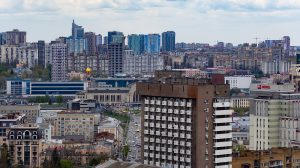A demographic decline and eternal political instability threaten to slow Bulgaria’s economic growth.
Bulgaria, despite facing numerous challenges (not the least of which is its ongoing inability to put together a stable government), continues to show resilience and a great deal of potential for further economic growth.
In the first quarter of 2024, Bulgaria’s GDP growth rate was 0.4 per cent quarter-on-quarter, reflecting a modest but steady expansion in economic activity. Annually, the GDP growth for the same period stood at 1.8 per cent, indicating a slight slowdown compared to previous years.
- Democratic decline and a new political crisis in Bulgaria
- The indisputable benefits of EU membership
- The success of the EU’s 2004 enlargement must drive a new wave of expansion
This deceleration can be attributed to weaker external demand and reduced inventory accumulation, factors that have weighed on the country’s economic performance in recent months.
The European Commission nevertheless recently updated its forecast for Bulgaria’s GDP growth, projecting a 1.9 per cent increase in 2024. This marks a slight improvement over the previous year’s performance and suggests a gradual recovery in economic activity.
For 2025, the Commission expects GDP growth to accelerate to 2.9 per cent, driven by a rebound in exports and continued domestic demand expansion.
Could do better
While relatively decent, the figures are far from impressive and betray the lack of political stability that has plagued the country for several years and which has had direct economic consequences.
On June 9, Bulgaria held its sixth parliamentary election in just three years which proved just as inconclusive as the previous five. The broadly centre-right Citizens for European Development of Bulgaria (GERB) party of former prime minister, Boyko Borissov, won the election, but will need at least two coalition partners to form a government—meaning that Bulgaria’s political crisis will likely go on, and that yet another election by year’s end cannot be ruled out.
This prolonged political crisis has delayed essential reforms in areas such as judicial independence, public administration, and the business environment. Such delays have slowed down economic activity and reduced the effectiveness of government initiatives aimed at stimulating growth.
Moreover, the political uncertainty has affected investor confidence and the overall economic outlook. In the World Competitiveness Handbook, published this week by the Swiss business school IMD, Bulgaria ranked 58th out of 67 countries included—a fall of one place from 2023 and a drop of ten places since 2020. As well as political instability the index highlights low competitiveness and productivity, endemic corruption and a substantial informal economy as reasons for Bulgaria’s poor performance.
Labour shortage
It also points to labour shortages, a problem that Bulgaria has faced for years as a result of emigration and low birth rates. A census in 2022 put the country’s population at 6.5 million, which represents a fall of almost 11.5 per cent since the previous census in 2011: some 844,000 people.
Since the late 1980s, when Bulgaria’s population peaked at just under nine million, the country has lost more than a quarter of its people. By 2050, the country is forecast to see its population reduced to just 5.4 million.
The country’s authorities are at least aware of the problem. On June 17, Giorgi Parvanov, a key member of Bulgaria’s Employment Confederation, declared that the country needed to import up to 300,000 workers. “The import of foreign workers does not threaten jobs for Bulgarians, because the demographic picture in our country is tragic,” he said, adding that the workers should not, however, be brought in from just one country but several.
He cited three countries of Central Asia—Kazakhstan, Kyrgyzstan, Uzbekistan—as potential sources, alongside India, Nepal, Sri Lanka and Vietnam.
Key sectors
The country is not without success stories, however. Its IT industry is increasingly competitive—it was ranked in tenth place (of 23 countries) in Emerging Europe’s most recent IT Competitiveness Index. The IT sector benefits from a skilled workforce which earns far higher salaries than the national average and has become a key location for outsourcing while also developing a vibrant start-up scene. It now accounts for more than three per cent of GDP.
Manufacturing, which accounts for a quarter of GDP, remains the cornerstone of the Bulgarian economy. The country has a long tradition in manufacturing, particularly in sectors such as machinery, electronics, automotive parts, and textiles.
Competitive production costs and proximity to major European markets have traditionally made Bulgaria an attractive location for manufacturing investments, but labour shortages are beginning to bite in some sectors.
Nevertheless, the automotive industry, in particular, has seen significant growth, with several global companies establishing production facilities in the country—most recently Belgium’s Avesta, which announced plans for a battery gigafactory in Stara Zagora for the automotive industry.
This sector not only contributes to GDP but also plays a crucial role in the export economy, with manufactured goods accounting for a substantial portion of Bulgaria’s exports. Last month, President Rumen Radev said that the automotive industry is “living proof” that Bulgaria can develop extremely quickly in a sector that defines the future of Europe and the world.
Agriculture has historically been an important sector in Bulgaria, and it continues to play a vital role in the economy. The country’s diverse climate and fertile soil provide ideal conditions for a wide range of agricultural activities, including the cultivation of grains, fruits, vegetables, and tobacco.
Bulgaria is also known for its wine production, with a long tradition of viticulture and a growing reputation for higher quality wines. While the sector’s contribution to GDP has declined over the years (to around four per cent) due to industrialisation and urbanisation, agriculture remains a significant source of employment, particularly in rural areas.
Additionally, EU agricultural subsidies have provided much-needed support to Bulgarian farmers, helping to modernise the sector and improve productivity.
Tourism is another key pillar of Bulgaria’s economy, contributing more than 12 per cent of GDP and attracting millions of visitors each year. The country boasts a rich cultural heritage, stunning natural landscapes, and a favourable climate, making it a popular destination in both winter and summer.
Key attractions include the Black Sea coast, the historic city of Plovdiv, the Rila Monastery, and numerous ski resorts in the Balkan Mountains. The tourism sector supports tens of thousands of jobs and stimulates investment in infrastructure and services.
However, the sector has faced challenges in recent years, including the impact of the Covid-19 pandemic, which led to a significant decline in tourist arrivals and revenue, and labour shortages—especially among seasonal workers.
Despite these challenges, the long-term prospects for tourism in Bulgaria remain positive, given the country’s diverse offerings and efforts to promote sustainable tourism.
Time to promote innovation and entrepreneurship
Nevertheless, Bulgaria’s economy clearly faces significant challenges. The demographic challenge poses a significant threat to economic growth, while political instability threatens the business environment.
While Bulgaria has made progress in reducing bureaucratic hurdles and improving regulatory frameworks, more needs to be done to enhance the ease of doing business. Addressing issues such as corruption, judicial inefficiency, and inadequate infrastructure will be crucial in attracting and retaining investment—impossible without a stable government.
On the positive side, Bulgaria has several opportunities that could drive future growth. The country’s strategic location at the crossroads of Europe and Asia positions it as a key logistics and trade hub. Investment in infrastructure, such as transport and energy networks, could further enhance Bulgaria’s connectivity and competitiveness.
Additionally, leveraging EU funds for regional development, innovation, and environmental sustainability can provide a significant boost to the economy.
The ongoing digital transformation presents another opportunity for Bulgaria. By investing in digital infrastructure, education, and skills development, the country can position itself as a leader in the digital economy. The success of the IT sector demonstrates Bulgaria’s potential in this area, and further efforts to promote innovation and entrepreneurship could yield substantial economic benefits.
Unlike many news and information platforms, Emerging Europe is free to read, and always will be. There is no paywall here. We are independent, not affiliated with nor representing any political party or business organisation. We want the very best for emerging Europe, nothing more, nothing less. Your support will help us continue to spread the word about this amazing region.
You can contribute here. Thank you.







Add Comment